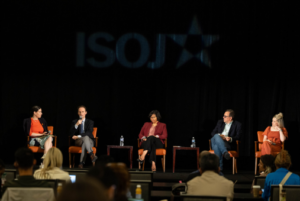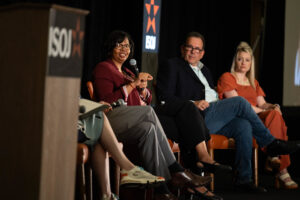“In a sentence, Press Forward is a movement to get more people to pay for local news,” said John Palfrey, President of the MacArthur Foundation, as he opened the inaugural panel of the 25th International Symposium on Online Journalism (ISOJ).
“We can get off the stage. That’s the effort: To get more people thinking about this as something to support. If you want the headline: Press Forward is about more people should pay more money for news, particularly at the local level. Otherwise, we won’t have a democracy in America. More people need to pay more money for local news, so we can have a democracy. That’s it.”

Panelists at 25th ISOJ on April 12 discuss Press Forward’s efforts to fund journalism in the United States. (Patricia Lim/Knight Center)
Though Palfrey’s statement hinted at a conclusion, it merely set the stage. Over the next 90 minutes, Palfrey and his fellow panelists delved into the origins, operations, aspirations, and future prospects of Press Forward during the panel “Press Forward: A half-billion-dollar philanthropic initiative to revitalize U.S. local news,” held Friday morning (April 12) at the University of Texas at Austin.
The panel featured other key figures in the initiative: Press Forward Director Dale R. Anglin; Jim Brady, vice president of Journalism at the Knight Foundation; and Courtney Bengston, chief strategy officer at the Wichita Foundation. Moderating the discussion was Rachel Davis Mersey, Dean of the Moody College of Communication, UT Austin. Together, they explored various aspects of Press Forward, ranging from the origins of the initiative to its practical implementation.
Palfrey initiated the discussion by tracing the movement’s origins, announced in September with the ambitious objective of distributing $500 million in journalism grants over the next five years.
According to Palfrey, the MacArthur Foundation has upheld a longstanding commitment to supporting journalism, primarily through traditional outlets like NPR. However, following a strategic review, they decided to more than double their support for journalism, allocating an additional $150 million to local news, on top of the initial $150 million earmarked for journalism, plus a $25 million in impact investment.
Despite this amount, financing local journalism requires more funding. That’s why Palfrey spent the past 18 months “on planes, going from place to place,” until securing 57 donors for the Press Forward coalition.
While the initiative has seen success thus far, Palfrey emphasized that sustained success hinges on local funding.
“It has to be funded locally,” Palfrey emphasized. “Ultimately, the success of this is when people in communities, individuals, families, family foundations, all step up and say ‘We have to fund local news’. If it doesn’t happen, it’s not gonna work.”
The backdrop against which this initiative unfolds is worrisome: a study by Northwestern University revealed that 2.5 local American news outlets closed their doors every week in 2023. At this rate, by the end of next year, 3,000 outlets — a third of all American local newsrooms — will have closed since 2005.
Next to address the gathering was Jim Brady, from the Knight Foundation, which last September announced a $150 million donation over five years to Press Forward. Brady lauded the growing number of donors for local journalism, and underscored the necessity for this support to become habitual for the industry to thrive.
“There’s not enough money for national philanthropy to give money to every local news organization in the country, it just doesn’t scale. But if you get local funders to start taking that responsibility locally, and you get national funders to look at the bigger picture, then that’s an interesting partnership,” Brady said. “It’s a once-in-a-generation opportunity to solve this problem that’s beset us for the last 25 years.”
Press Forward Director Dale R. Anglin shed light on the initiative’s local operations. Anglin emphasized that Press Forward doesn’t seek to dictate to local media, but rather aims to empower them, taking into account local contexts.
“There are 20 chapters, and there are 20 origin stories,” Anglin said, highlighting that every case has its own features. “It really is not for national to come and then tell local how to do it. It is to galvanize and educate and get people to understand that we all have this issue in every community.”
Anglin illustrated with examples. In Florida, for instance, two individual donors collaborated with a community foundation to allocate resources. In other cases, journalists themselves took the lead.
Courtney Bengtson, chief strategy officer of the Wichita Foundation, offered a practical illustration of Press Forward’s operations. She recounted how, five years ago, their foundation’s predictive study revealed that the community of about 600,000 in Kansas lacked awareness of its challenges.

Panelists at 25th ISOJ on April 12 discuss Press Forward’s efforts to fund journalism in the United States. (Patricia Lim/Knight Center)
“The predictive analysis company said, ‘You can say all of these things, but your community doesn’t even know that these challenges exist, because they’re not informed about them,’” Bengtson said. “In philanthropy in general, sometimes we think ‘We can do the X, Y and Z,’ and how can we affect all those pieces. And we just took a step back as an organization and said, ‘People need to know what’s going on. If they don’t know what’s happening, they can’t affect this change.’”
This made the foundation where she works to start focusing on “news and information.” Bengtson said that, after five years of focusing on supporting journalism, now her organization is part of a network.
“I feel like we lived on a lonely island for a while, and I don’t feel that way anymore. I feel like we now have a kind of network of communities coming together to really say, ‘Hey, local news and information are as important in your community as all the other social and cultural services you have. We want people to be able to make informed and engaged decisions about the things that affect their daily lives.’”
The discussion concluded with an announcement: on April 30, Press Forward will issue its first national call for proposals to support local journalism projects in the United States.
The remainder of the panel featured discussions on mobilizing local donors. About this, speakers suggested emphasizing messages that resonate with the interests of donors and that demonstrate the relevance of quality information to any other field.
The panel also discussed the initiative’s medium-term aspirations. On this front, speakers shared a common vision: in five years, they hope to see a more robust economic ecosystem for journalism, with donations to journalism becoming a commonplace occurrence.
“[Success means] making funding local journalism a habit locally. It just becomes a thing that people fund, and it’s not something that they do as a one or two year special effort. They actually say, ‘This is something I care about, and I care about it in the long term’. If we can make a lot of these community foundations that are joining press forward stick with it into the long term, that’s a huge success,” Brady said.
ISOJ is a global online journalism conference organized by the Knight Center for Journalism in the Americas at the University of Texas at Austin. In 2024, it is celebrating 25 years of bringing together journalists, media executives and scholars to discuss the impact of the digital revolution on journalism.